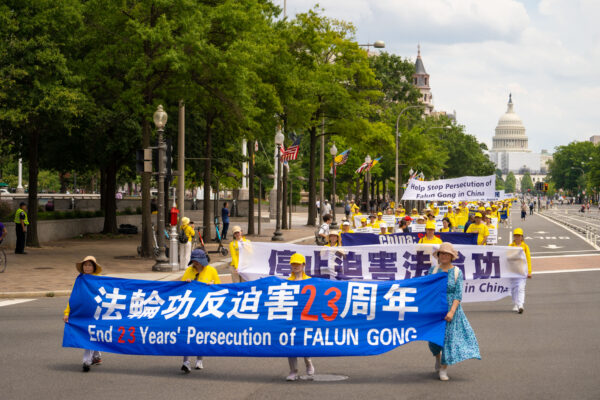Sanction Chinese Officials Involved in Human Rights Abuses: Former PM
Australia should sanction Chinese officials involved in human rights abuses against Uyghurs, says former Prime Minister Scott Morrison. “The question naturally arises whether our new sanctions regime should be applied to any Chinese nationals for human rights abuses, especially in Xinjiang,” Morrison told attendees of an Inter-Parliamentary Alliance on China meeting in Tokyo on Feb. 17. “There is certainly credible and actionable evidence that has been gathered against such individuals,” he said. “It is now a matter for the new government to consider.” Morrison lost office following an electoral defeat in the May 2022 election but was a key figure in positioning Australia to better deal with the Chinese Communist Party threat, including playing an integral role in pulling together the AUKUS deal. Magnitsky Laws Set Up To Tackle Human Rights Abusers Australia’s Magnitsky-style laws, known as the Autonomous Sanctions Amendment (Magnitsky‑style and Other Thematic Sanctions) Regulations 2021, were formally introduced in November 2021 and passed in December 2021 during the Morrison government’s tenure. This legislation gives Australia the power to impose sanctions against overseas human rights violators, including officials in China who have been responsible for human rights abuses against Uyghur Muslims in Xinjiang, house Christians, Tibetans, and Falun Gong practitioners. The sanctions include freezing the assets of officials and their family members, as well as travel bans. In response to Magnitsky sanctions, the Chinese regime on June 10, 2021, passed its own law to create an “anti-sanctions” list that forbids entry to listed individuals from entering China or expels those currently residing in China. Falun Gong practitioners march down Constitution Avenue to commemorate the 23rd anniversary of the Chinese Communist Party’s persecution of the spiritual practice in China, in Washington on July 21, 2022. (Samira Bouaou/The Epoch Times) “While it would be naive to believe that targeted sanctions of Chinese officials in Xinjiang or higher up would lead to the elimination of such abuses, this argument alone does negate the merit of such sanctions,” Morrison said. “As a former prime minister, I understand there are always practical issues to consider within the relationship, not the least being the practical issues of possible impacts on Australian citizens being held by the Chinese government. “However, one argument that should not prevail is that we would not progress such sanctions for fear of political, trade, or diplomatic reprisals from the Chinese government. The application of Australia’s human rights sanctions regime is reserved for the most egregious situations of international concern.” He cited an August 2022 report from the Office of the Higher Commissioner on Human Rights that found “patterns of torture or ill-treatment, including forced medical treatment and adverse conditions of detention” as well as “sexual and gender-based violence.” The former prime minister warned, however, that if the CCP became too powerful, it would be difficult to deal with human rights abuses. Since the laws were passed in Australia, sanctions have been placed on 68 individuals and three entities, mainly Russian, Iranian, and Myanmar officials. According to Amnesty International, the state of human rights continues to deteriorate in China, where human rights lawyers and activists face harassment and intimidation, unfair trials, lengthy detention, torture, and other ill-treatment simply for exercising their right to freedom of expression. For example, on Dec. 2, 2022, radio host Pang Xun, a Falun Gong practitioner, died in southwest China while serving a prison sentence. Pang was arrested in July 2020 for practicing Falun Gong. Don’t Fall For Beijing’s Charm Offensive, Morrison Says Morrison also added that “liked-minded” nations such as Japan, India, the United States, and the UK have all called out the bullying caused by the Chinese regime through initiatives such as the QUAD and AUKUS. “Going forward I am pleased the new Australian government can take advantage of China’s change in tactics, but they must be careful not to change our posture or resolve, or give the impression of such a change. “President Xi (Jinping) may have changed his tactics, but his intent is still the same. You can be sure that President Xi is keeping his ‘Chinese Dream’ alive.” His comments come as Beijing attempts to “normalise” relations with Australia.

Australia should sanction Chinese officials involved in human rights abuses against Uyghurs, says former Prime Minister Scott Morrison.
“The question naturally arises whether our new sanctions regime should be applied to any Chinese nationals for human rights abuses, especially in Xinjiang,” Morrison told attendees of an Inter-Parliamentary Alliance on China meeting in Tokyo on Feb. 17.
“There is certainly credible and actionable evidence that has been gathered against such individuals,” he said. “It is now a matter for the new government to consider.”
Morrison lost office following an electoral defeat in the May 2022 election but was a key figure in positioning Australia to better deal with the Chinese Communist Party threat, including playing an integral role in pulling together the AUKUS deal.
Magnitsky Laws Set Up To Tackle Human Rights Abusers
Australia’s Magnitsky-style laws, known as the Autonomous Sanctions Amendment (Magnitsky‑style and Other Thematic Sanctions) Regulations 2021, were formally introduced in November 2021 and passed in December 2021 during the Morrison government’s tenure.
This legislation gives Australia the power to impose sanctions against overseas human rights violators, including officials in China who have been responsible for human rights abuses against Uyghur Muslims in Xinjiang, house Christians, Tibetans, and Falun Gong practitioners.
The sanctions include freezing the assets of officials and their family members, as well as travel bans.
In response to Magnitsky sanctions, the Chinese regime on June 10, 2021, passed its own law to create an “anti-sanctions” list that forbids entry to listed individuals from entering China or expels those currently residing in China.

“While it would be naive to believe that targeted sanctions of Chinese officials in Xinjiang or higher up would lead to the elimination of such abuses, this argument alone does negate the merit of such sanctions,” Morrison said.
“As a former prime minister, I understand there are always practical issues to consider within the relationship, not the least being the practical issues of possible impacts on Australian citizens being held by the Chinese government.
“However, one argument that should not prevail is that we would not progress such sanctions for fear of political, trade, or diplomatic reprisals from the Chinese government. The application of Australia’s human rights sanctions regime is reserved for the most egregious situations of international concern.”
He cited an August 2022 report from the Office of the Higher Commissioner on Human Rights that found “patterns of torture or ill-treatment, including forced medical treatment and adverse conditions of detention” as well as “sexual and gender-based violence.”
The former prime minister warned, however, that if the CCP became too powerful, it would be difficult to deal with human rights abuses.
Since the laws were passed in Australia, sanctions have been placed on 68 individuals and three entities, mainly Russian, Iranian, and Myanmar officials.
According to Amnesty International, the state of human rights continues to deteriorate in China, where human rights lawyers and activists face harassment and intimidation, unfair trials, lengthy detention, torture, and other ill-treatment simply for exercising their right to freedom of expression.
For example, on Dec. 2, 2022, radio host Pang Xun, a Falun Gong practitioner, died in southwest China while serving a prison sentence. Pang was arrested in July 2020 for practicing Falun Gong.
Don’t Fall For Beijing’s Charm Offensive, Morrison Says
Morrison also added that “liked-minded” nations such as Japan, India, the United States, and the UK have all called out the bullying caused by the Chinese regime through initiatives such as the QUAD and AUKUS.
“Going forward I am pleased the new Australian government can take advantage of China’s change in tactics, but they must be careful not to change our posture or resolve, or give the impression of such a change.
“President Xi (Jinping) may have changed his tactics, but his intent is still the same. You can be sure that President Xi is keeping his ‘Chinese Dream’ alive.”
His comments come as Beijing attempts to “normalise” relations with Australia.












